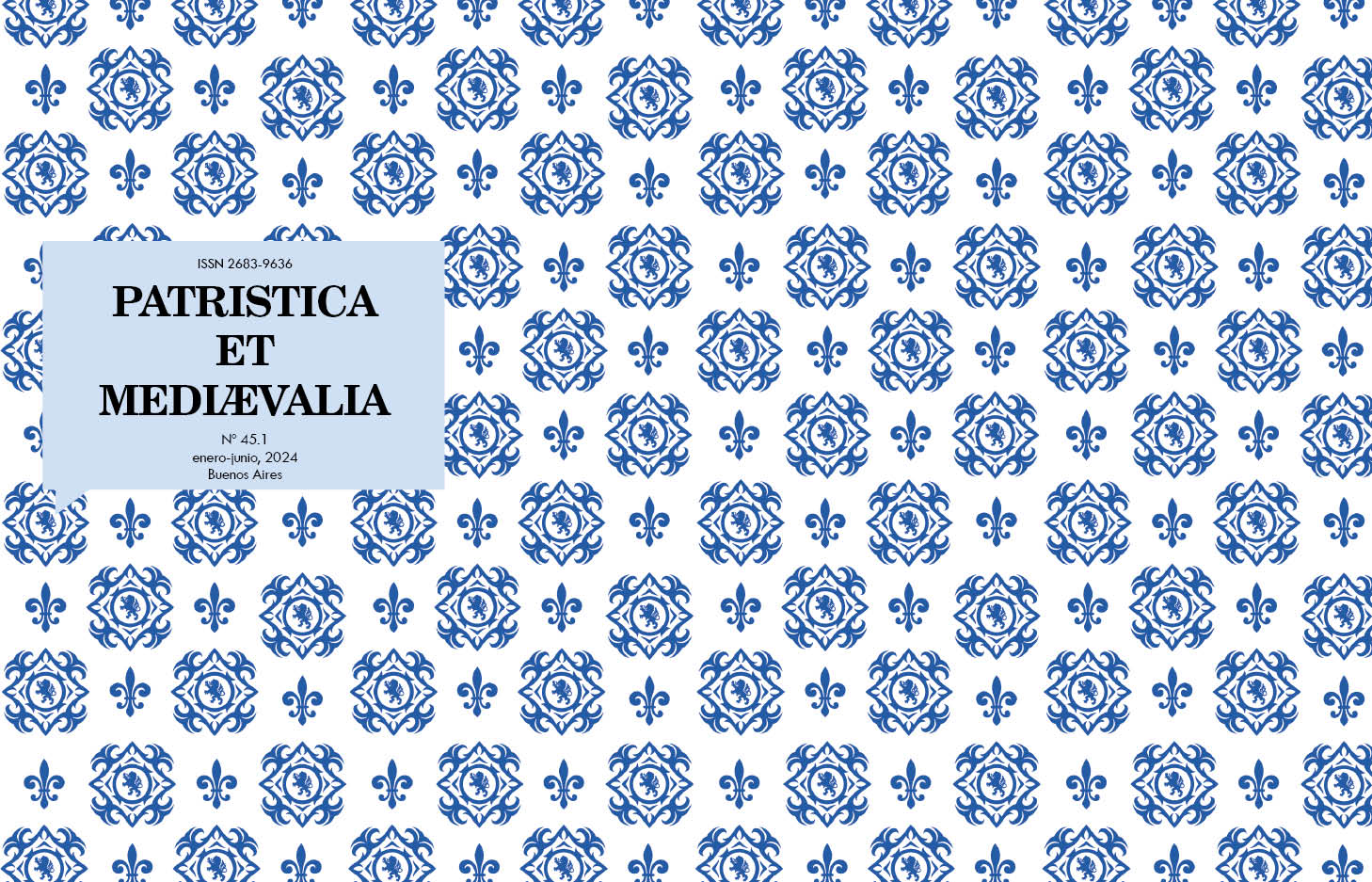Daemons, Cups of Forgetfulness and Eternity of the Soul in Irenaeus’ Adversus haereses 2.33-34
The Influence of Strato of Lampsacus in his View of Participation
Abstract
In Adversus haereses 2.33-34, Irenaeus rejects the Platonic view of the pre-existence of the soul, and his tale of a daemon who serves up the drink from the Lethe, the river of forgetfulness. Irenaeus’ argument appears in the context of a larger polemic against the Carpocratian view of education and recollection, so it appropriately draws from philosophical discussions on education and recollection. When Irenaeus’ opposes the Platonic myth, his argument reflects Strato of Lampsacus, a Peripatetic philosopher. I will highlight the parallels between them, particularly in their description of the soul as participating in life rather than being life itself, an affirmation that has created some contention within studies of Irenaeus’ theology. Finally, I suggest that this dependence in Book 2 of Adversus haereses continues in one of Irenaeus’s most famous descriptions of participation in haer. 4.20.5, for Irenaeus uses the same metaphor of light and the same verb that Strato uses. In addition to studying the parallels between Irenaeus and Strato, which has not been done yet, my main contribution is to suggest that Strato’s influence should be recognized in the famous Irenaeus’s view of participation.Downloads
References
Irénée de Lyon (1965). Contre Les Hérésies, Livre IV. Ed. Rousseau, A. París: Éd. du Cerf. (SC 100).
Irénée de Lyon (1982). Contre Les Hérésies, Livre II. Ed. Rousseau, A. y Doutreleau, L. París: Éd. du Cerf. (SC 294).
Irénée de Lyon (1982b). Contre Les Hérésies, Livre II: Introduction, Notes Justificatives et Tables. Ed. Rousseau, A. y Doutreleau, L. París: Éd. du Cerf. (SC 293).
Ireneo (1996). Teología de San Ireneo. Vol 4. Orbe, A. (trad.). Madrid: BAC.
Irenaeus of Lyons (2012). Against Heresies, Book 2. Ed. Unger, D. J. y Steenberg, M. C. Nueva York: Paulist Press. (ACW 65).
Irenaeus of Lyons (2012). Against Heresies, Book 3. Ed. Unger, D. J. y Steenberg, M. C. Nueva York: Paulist Press. (ACW 64).
Justin Martyr (1885) Dialogue with Trypho. Trad. Roberts, A. y Donaldson, J. Peabody, MA: Hendrickson. Reprint, 2012. (ANF 1).
Strato of Lampsacus (2011). Text, Translation and Discussion. Ed. Desclos, M. L. y Fortenbaugh, W. Londres: Routledge.
Tertullian (1885) On the Soul. Ed. Coxe, A. Clevland. Peabody, MS: Hendrickson. Reprint, 2012. (ANF 3).
Tertullianus (2010). De Anima. Ed. Waszink, J. H. Leiden - Boston: Brill.
Bacq, P. (1987). De l’ancienne à la nouvelle Alliance selon S. Irénée: Unité du livre IV de l’Adversus haereses. París: Éditions Lethielleux.
Behr, J. (2000). Asceticism and Anthropology in Irenaeus and Clement. Oxford: Oxford University Press.
Behr, J. (2013). Irenaeus of Lyons: Identifying Christianity. Oxford: Oxford University Press.
Briggman, A. (2019). God and Christ in Irenaeus. Oxford: Oxford University Press.
Briggman, A. (2012). Irenaeus of Lyons and the Theology of the Holy Spirit. Oxford: Oxford University Press.
Canlis, J. (2005). “Being Made Human: The Significance of Creation for Irenaeus’ Doctrine of Participation”, Scottish Journal of Theology 58.4, 434-454.
De Andia, Y. (1986). Homo Vivens: Incorruptibilité et divinisation de l’homme selon Irénée De Lyon. París: Institute d’Études Augustiniennes.
Fantino, J. (1994). La Théologie d’Irénée. París: Éd. du Cerf.
Gertz, S. (2015). “From ‘Immortal’ to ‘Imperishable’: Damascius on the Final Argument in Plato’s Phaedo”. En: Sylvain Delcomminette, P. y Gavray, M.-A. (eds.). Ancient Readings of Plato’s Phaedo. Leiden: Brill.
Grant, R. M. (1956). “Aristotle and the Conversion of Justin”, The Journal of Theological Studies 7, 246-248.
Grant, R. M. (1986). “Carpocratians and Curriculum: Irenaeus’ Reply”, Harvard Theological Review 79.1, 127-136.
Hort, F. J. (1923). “Did Tertullian use the Latin Irenaeus?”. En: Sanday, W. y Turner, C. (eds.). Nouum Testamentum Sancti Irenaei Episcopi Lugdunensis. Vol. VII. Oxford: Clarendon Press, pp. xxxvi-lvi.
Long, A. A. y Sedley, D. N. (eds.) (1987). The Hellenistic Philosophers. Cambridge: Cambridge University Press.
May, G. (2004). Creatio ex nihilo: The Doctrine of ‘Creation out of Nothing’ in Early Christian Thought. Worrall, A. S. (trads.) Edimburgo: T&T Clark.
Osborn, E. (2001). Irenaeus of Lyons. Cambridge: Cambridge University Press.
Otero de Santos, A. (1973). “Dos capítulos inéditos del original griego de Ireneo de Lyon (Adversus Haeresis II 50-51) en el códice Vatopedi 236”, Emerita 41.2, 479-489.
Rousseau, A. (1977). “L’éternité des peines de l’enfer et l’immortalité naturelle de l’âme selon saint Irénée”, Nouvelle Revue Théologique 99.6, 834-864.
Schneider, J-P. (2016). “Straton de Lampsaque”. En: Goulet, R. (ed.). Dictionnaire des philosophes antiques. París: CNRS éditions, 614-630.
Schoedel, W. (1959). “Philosophy and Rhetoric in the Adversus Haereses of Irenaeus”, Vigiliae Christianae 13.1, 22-32.
Schoedel, W. (1984). “Theological Method in Irenaeus (Adversus Haeresus 2.25-28)”, The Journal of Theological Studies 35.1, 31-49.
Simons, J. (2023). Divine Simplicity in the Theology of Irenaeus. Brill.
1. The authors who publish in this magazine accept the following conditions:
-
They retain the copyright and grant to the magazine the right of the first publication, with the work registered under the Attribution-ShareAlike 4.0 International License that allows third parties to use what is published as long as they mention the authorship of the work and the first publication in this magazine.
-
They can make other independent and additional contractual agreements for the non-exclusive distribution of the version of the article published in this magazine (eg. include it in an institutional repository or publish it in a book) provided that they clearly indicate that the work was first published in this journal.
-
They are allowed and recommended to publish their work on the Internet (for example on institutional or personal pages).
2. AutoArchive Conditions. Authors are allowed and encouraged to distribute post-print electronic versions of their manuscripts because it promotes their circulation, a possible increase of quotation and a major reach among the Academic community. Color RoMEO: blue.













